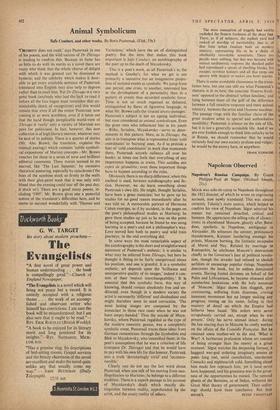Napoleon Observed
Campaign. By Count Segur. (Michael lciseph, Moult was aide-de-camp to Napoleon throughout the 1812 disaster, of which he wrote an engrossing account, now newly translated. This was almost certainly Tolstoy's main source, which helped to confirm his view of Napoleon. Segur admired his master but remained detached, critical and humane. He appreciates the telling role of silence : ironic in abandoned Moscow, ghastly after Boro- dino, apathetic in Napoleon, ambiguous in Alexander. He witnesses the sinister, preliminary thunderstorm, Kutuzov lumbering amongst his priests, Moscow burning, the fantastic escapades of Murat and Ney. Related by marriage to Rostopchin, he attributes Moscow's destruction chiefly to the Governor's fear of political revolu- tion, though the invader had refused to abolish serfdom or encourage popular risings. Napoleon dominates the book, but he seldom dominated events. Having, fooled devotees on behalf of the Poles and Lithuanians, he became obsessed after numberless hesitations with the holy nonsense of 'Moscow.' Segur shows him sluggish, pro- crastinating, suffering from dysuresis, craving incessant movement but no longer making any progress, resting on his name, failing in that mastery of detail on which the Empire had hitherto been based. 'His orders were never scrupulously carried out, except when he was present.' Only his nerve seemed intact : during the last roaring days in Moscow he coolly worker! on the affairs of the Comedic Frangaise. But he retained some mother-wit to the end. 'What is War? A barbarous profession whose art consists of being stronger than the enemy at a given moment.' Segur watches the deepening fantasy, a haggard war-god ordering imaginary armies to posts long lost, amid cannibalism, murderous Cossacks and nightmarish cold. Something about him made few reproach him; yet it need never have happened, and his greatness was in the great- ness of the opportunities he missed. The tattered ghosts of the Beresina, as of Sedan, withered the Great Man theory of government. Their suffer- ings should have been conclusive. But they


































 Previous page
Previous page